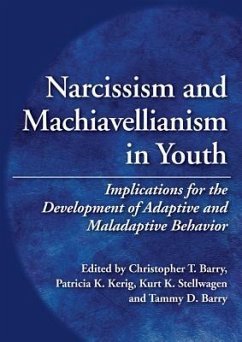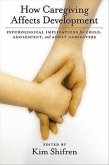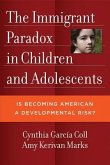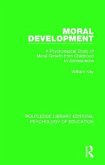Narcissism and Machiavellianism in Youth: Implications for the Development of Adaptive and Maladaptive Behavior
Herausgeber: Barry, Christopher T.; Stellwagen, Kurt; Kerig, Patricia K.
Narcissism and Machiavellianism in Youth: Implications for the Development of Adaptive and Maladaptive Behavior
Herausgeber: Barry, Christopher T.; Stellwagen, Kurt; Kerig, Patricia K.
- Gebundenes Buch
- Merkliste
- Auf die Merkliste
- Bewerten Bewerten
- Teilen
- Produkt teilen
- Produkterinnerung
- Produkterinnerung
Highlights how knowledge of both narcissism and Machiavellianism may influence problematic youth social interactions as well as youth adaptation to developmental contexts such as peer relationships.
Andere Kunden interessierten sich auch für
![How Caregiving Affects Childhood Development: Psychological Implications for Child, Adolescent, and Adult Caregivers How Caregiving Affects Childhood Development: Psychological Implications for Child, Adolescent, and Adult Caregivers]() How Caregiving Affects Childhood Development: Psychological Implications for Child, Adolescent, and Adult Caregivers35,99 €
How Caregiving Affects Childhood Development: Psychological Implications for Child, Adolescent, and Adult Caregivers35,99 €![The Immigrant Paradox in Children and Adolescents: Is Becoming American a Developmental Risk? The Immigrant Paradox in Children and Adolescents: Is Becoming American a Developmental Risk?]() The Immigrant Paradox in Children and Adolescents: Is Becoming American a Developmental Risk?70,99 €
The Immigrant Paradox in Children and Adolescents: Is Becoming American a Developmental Risk?70,99 €![The Mind, The Brain And Complex Adaptive Systems The Mind, The Brain And Complex Adaptive Systems]() Harold J. MorowitzThe Mind, The Brain And Complex Adaptive Systems198,99 €
Harold J. MorowitzThe Mind, The Brain And Complex Adaptive Systems198,99 €![Mental Health, Psychiatric Disorders, and the Implications of Long COVID-19 Mental Health, Psychiatric Disorders, and the Implications of Long COVID-19]() Ying ZhangMental Health, Psychiatric Disorders, and the Implications of Long COVID-1916,71 €
Ying ZhangMental Health, Psychiatric Disorders, and the Implications of Long COVID-1916,71 €![Human Development from Early Childhood to Early Adulthood Human Development from Early Childhood to Early Adulthood]() Human Development from Early Childhood to Early Adulthood186,99 €
Human Development from Early Childhood to Early Adulthood186,99 €![Malignant Narcissism and Power Malignant Narcissism and Power]() Charles ZeidersMalignant Narcissism and Power51,99 €
Charles ZeidersMalignant Narcissism and Power51,99 €![Moral Development Moral Development]() William KayMoral Development174,99 €
William KayMoral Development174,99 €-
-
-
Highlights how knowledge of both narcissism and Machiavellianism may influence problematic youth social interactions as well as youth adaptation to developmental contexts such as peer relationships.
Hinweis: Dieser Artikel kann nur an eine deutsche Lieferadresse ausgeliefert werden.
Hinweis: Dieser Artikel kann nur an eine deutsche Lieferadresse ausgeliefert werden.
Produktdetails
- Produktdetails
- Verlag: American Psychological Association (APA)
- Seitenzahl: 264
- Erscheinungstermin: August 2010
- Englisch
- Abmessung: 254mm x 183mm x 30mm
- Gewicht: 726g
- ISBN-13: 9781433808456
- ISBN-10: 1433808455
- Artikelnr.: 30164853
- Herstellerkennzeichnung
- Libri GmbH
- Europaallee 1
- 36244 Bad Hersfeld
- gpsr@libri.de
- Verlag: American Psychological Association (APA)
- Seitenzahl: 264
- Erscheinungstermin: August 2010
- Englisch
- Abmessung: 254mm x 183mm x 30mm
- Gewicht: 726g
- ISBN-13: 9781433808456
- ISBN-10: 1433808455
- Artikelnr.: 30164853
- Herstellerkennzeichnung
- Libri GmbH
- Europaallee 1
- 36244 Bad Hersfeld
- gpsr@libri.de
Christopher T. Barry, PhD, is an assistant professor in the Department of Psychology at the University of Southern Mississippi, Hattiesburg. He received his doctorate in clinical psychology from the University of Alabama, Tuscaloosa, with a specialization in children and adolescents. He completed his clinical internship at the University of Louisville School of Medicine, Louisville, Kentucky. He currently serves on the editorial board of the Journal of Clinical Child and Adolescent Psychology. Dr. Barry has coauthored a book on the assessment of personality and behavior in children and adolescents and has published numerous book chapters and peer-reviewed journal articles related to child and adolescent clinical psychology. Specifically, his research interest focuses on risk and protective factors related to child and adolescent problem behaviors, with a particular emphasis on self-esteem, narcissism, and psychopathy. He also conducts program evaluation of a residential program for at-risk adolescents and of a project-based science curriculum for middle school students. Patricia K. Kerig, PhD, is a professor and the director of clinical training in the Department of Psychology at the University of Utah, Salt Lake City. She received her degree in clinical psychology from the University of California, Berkeley, with a specialization in children and families. Her research honors include the Brodsky/Hare-Mustin Award from APA's Division 35 (Society for the Psychology of Women) and the New Contribution Award from the International Society of the Study of Personal Relationships. Currently, she is on the editorial boards of the Journal of Family Psychology®; the Journal of Child and Adolescent Trauma; and the Journal of Aggression, Maltreatment, and Trauma. She is the author of three books, 26 chapters, 36 peer-reviewed articles, and has been an editor of seven volumes and six journal special issues on topics related to developmental psychopathology and family relations, including interparental conflict, parent–child boundary dissolution, adolescent dating violence, juvenile delinquency, and childhood trauma. She is active in empirical research regarding the interpersonal and intrapersonal processes that contribute to the development of psychopathology and resilience. Kurt K. Stellwagen, PhD, is an assistant professor of psychology at Eastern Washington University, Cheney. He received his doctorate in school psychology from the University of North Carolina at Chapel Hill in 2006 after completing an internship in clinical psychology at the University of Tennessee Health Science Center, College of Medicine, Memphis. Dr. Stellwagen serves as a member of the graduate faculty at Eastern Washington University and mentors students pursuing degrees in school, clinical, and experimental psychology. He maintains an active research program with a primary focus on the mechanisms that link exploitive (e.g., psychopathic and Machiavellian) personality traits with the development and maintenance of interpersonally aggressive behavior. A secondary interest is the role that social intelligence plays in the manifestation of antisocial behavior and delinquency. Dr. Stellwagen has published his research in peer-reviewed psychology, psychiatry, and neuropsychology journals. Tammy D. Barry, PhD, is an associate professor in the Department of Psychology at the University of Southern Mississippi, Hattiesburg. She obtained her MA and PhD in clinical psychology, with a specialization in children and adolescents, from the University of Alabama, Tuscaloosa. She completed her clinical internship at the University of Alabama School of Medicine, Birmingham. Dr. Barry has published numerous peer-reviewed articles and book chapters related to child psychopathology, with an emphasis on externalizing behaviors (e.g., attention-deficit/hyperactivity disorder, oppositional defiant disorder, conduct disorder, aggression) and autism spectrum disorders. Specifically, Dr. Barry is interested in exploring contextual and biological correlates, including moderators and mediators, of these disorders. Her research has received federal grant support.
Contributors
Acknowledgments
Introduction: The Developmental Psychopathology of Narcissism and
Machiavellianism
—Kurt K. Stellwagen, Patricia K. Kerig, and Christopher T. Barry
I. Overview of Self-Perception and Related Personality Constructs in Youth
1. Emerging Personality in Childhood and Adolescence: Implications for
the Development of Narcissism and Machiavellianism
—Jennifer L. Tackett and Sarah Mackrell
2. Psychopathy, Narcissism, and Machiavellianism: Distinct yet
Intertwining Personality Constructs
—Kurt K. Stellwagen
3. Self-Esteem, Narcissism, and Machiavellianism: Implications for
Understanding Antisocial Behavior in Adolescents and Young Adults
—Edward A. Witt, M. Brent Donnellan, and Kali H. Trzesniewski
II. Narcissism
1. Developmental and Theoretical Influences on the Conceptualization and
Assessment of Youth Narcissism
—Christopher T. Barry, Marion T. Wallace, and Matthew D. Guelker
2. Adaptive and Maladaptive Narcissism in Adolescent Development
—Patrick L. Hill and Daniel K. Lapsley
3. Defensive Egotism and Aggression in Childhood: A New Lens on the
Self-Esteem Paradox
—Marlene Sandstrom
4. On Environmental Sources of Child Narcissism: Are Parents Really to
Blame?
—Robert S. Horton
5. Moving Beyond Parents in the Etiology of Narcissistic Traits
—Jason J. Washburn and Leah D. Paskar
6. Narcissism, Positive Illusory Bias, and Externalizing Behaviors
—Tammy D. Barry, Sarah J. Grafeman, Stephanie H. Bader, and Sarah E.
Davis
III. Machiavellianism
1. Early Adoption of Machiavellian Attitudes: Implications for
Children's Interpersonal Relationships
—Virginia Slaughter
2. The New Scoundrel on the Schoolyard: Contributions of
Machiavellianism to the Understanding of Youth Aggression
—Patricia K. Kerig and Holli E. Sink
3. Young Machiavellians and the Traces of Shame: Coping With
Vulnerability to a Toxic Affect
—Doris McIlwain
4. Machiavellianism in Elementary School Children: Risk and Adaptation
—Hanneke Palmen, Marjolijn M. Vermande, Maja Dekovi¿, and Marcel A.
G. van Aken
Conclusion: Current Themes, Future Directions, and Clinical Implications
Regarding Narcissism and Machiavellianism in Youth
—Eva R. Kimonis, Melissa Harrison, and Tammy D. Barry
Index
About the Editors
Acknowledgments
Introduction: The Developmental Psychopathology of Narcissism and
Machiavellianism
—Kurt K. Stellwagen, Patricia K. Kerig, and Christopher T. Barry
I. Overview of Self-Perception and Related Personality Constructs in Youth
1. Emerging Personality in Childhood and Adolescence: Implications for
the Development of Narcissism and Machiavellianism
—Jennifer L. Tackett and Sarah Mackrell
2. Psychopathy, Narcissism, and Machiavellianism: Distinct yet
Intertwining Personality Constructs
—Kurt K. Stellwagen
3. Self-Esteem, Narcissism, and Machiavellianism: Implications for
Understanding Antisocial Behavior in Adolescents and Young Adults
—Edward A. Witt, M. Brent Donnellan, and Kali H. Trzesniewski
II. Narcissism
1. Developmental and Theoretical Influences on the Conceptualization and
Assessment of Youth Narcissism
—Christopher T. Barry, Marion T. Wallace, and Matthew D. Guelker
2. Adaptive and Maladaptive Narcissism in Adolescent Development
—Patrick L. Hill and Daniel K. Lapsley
3. Defensive Egotism and Aggression in Childhood: A New Lens on the
Self-Esteem Paradox
—Marlene Sandstrom
4. On Environmental Sources of Child Narcissism: Are Parents Really to
Blame?
—Robert S. Horton
5. Moving Beyond Parents in the Etiology of Narcissistic Traits
—Jason J. Washburn and Leah D. Paskar
6. Narcissism, Positive Illusory Bias, and Externalizing Behaviors
—Tammy D. Barry, Sarah J. Grafeman, Stephanie H. Bader, and Sarah E.
Davis
III. Machiavellianism
1. Early Adoption of Machiavellian Attitudes: Implications for
Children's Interpersonal Relationships
—Virginia Slaughter
2. The New Scoundrel on the Schoolyard: Contributions of
Machiavellianism to the Understanding of Youth Aggression
—Patricia K. Kerig and Holli E. Sink
3. Young Machiavellians and the Traces of Shame: Coping With
Vulnerability to a Toxic Affect
—Doris McIlwain
4. Machiavellianism in Elementary School Children: Risk and Adaptation
—Hanneke Palmen, Marjolijn M. Vermande, Maja Dekovi¿, and Marcel A.
G. van Aken
Conclusion: Current Themes, Future Directions, and Clinical Implications
Regarding Narcissism and Machiavellianism in Youth
—Eva R. Kimonis, Melissa Harrison, and Tammy D. Barry
Index
About the Editors
Contributors
Acknowledgments
Introduction: The Developmental Psychopathology of Narcissism and
Machiavellianism
—Kurt K. Stellwagen, Patricia K. Kerig, and Christopher T. Barry
I. Overview of Self-Perception and Related Personality Constructs in Youth
1. Emerging Personality in Childhood and Adolescence: Implications for
the Development of Narcissism and Machiavellianism
—Jennifer L. Tackett and Sarah Mackrell
2. Psychopathy, Narcissism, and Machiavellianism: Distinct yet
Intertwining Personality Constructs
—Kurt K. Stellwagen
3. Self-Esteem, Narcissism, and Machiavellianism: Implications for
Understanding Antisocial Behavior in Adolescents and Young Adults
—Edward A. Witt, M. Brent Donnellan, and Kali H. Trzesniewski
II. Narcissism
1. Developmental and Theoretical Influences on the Conceptualization and
Assessment of Youth Narcissism
—Christopher T. Barry, Marion T. Wallace, and Matthew D. Guelker
2. Adaptive and Maladaptive Narcissism in Adolescent Development
—Patrick L. Hill and Daniel K. Lapsley
3. Defensive Egotism and Aggression in Childhood: A New Lens on the
Self-Esteem Paradox
—Marlene Sandstrom
4. On Environmental Sources of Child Narcissism: Are Parents Really to
Blame?
—Robert S. Horton
5. Moving Beyond Parents in the Etiology of Narcissistic Traits
—Jason J. Washburn and Leah D. Paskar
6. Narcissism, Positive Illusory Bias, and Externalizing Behaviors
—Tammy D. Barry, Sarah J. Grafeman, Stephanie H. Bader, and Sarah E.
Davis
III. Machiavellianism
1. Early Adoption of Machiavellian Attitudes: Implications for
Children's Interpersonal Relationships
—Virginia Slaughter
2. The New Scoundrel on the Schoolyard: Contributions of
Machiavellianism to the Understanding of Youth Aggression
—Patricia K. Kerig and Holli E. Sink
3. Young Machiavellians and the Traces of Shame: Coping With
Vulnerability to a Toxic Affect
—Doris McIlwain
4. Machiavellianism in Elementary School Children: Risk and Adaptation
—Hanneke Palmen, Marjolijn M. Vermande, Maja Dekovi¿, and Marcel A.
G. van Aken
Conclusion: Current Themes, Future Directions, and Clinical Implications
Regarding Narcissism and Machiavellianism in Youth
—Eva R. Kimonis, Melissa Harrison, and Tammy D. Barry
Index
About the Editors
Acknowledgments
Introduction: The Developmental Psychopathology of Narcissism and
Machiavellianism
—Kurt K. Stellwagen, Patricia K. Kerig, and Christopher T. Barry
I. Overview of Self-Perception and Related Personality Constructs in Youth
1. Emerging Personality in Childhood and Adolescence: Implications for
the Development of Narcissism and Machiavellianism
—Jennifer L. Tackett and Sarah Mackrell
2. Psychopathy, Narcissism, and Machiavellianism: Distinct yet
Intertwining Personality Constructs
—Kurt K. Stellwagen
3. Self-Esteem, Narcissism, and Machiavellianism: Implications for
Understanding Antisocial Behavior in Adolescents and Young Adults
—Edward A. Witt, M. Brent Donnellan, and Kali H. Trzesniewski
II. Narcissism
1. Developmental and Theoretical Influences on the Conceptualization and
Assessment of Youth Narcissism
—Christopher T. Barry, Marion T. Wallace, and Matthew D. Guelker
2. Adaptive and Maladaptive Narcissism in Adolescent Development
—Patrick L. Hill and Daniel K. Lapsley
3. Defensive Egotism and Aggression in Childhood: A New Lens on the
Self-Esteem Paradox
—Marlene Sandstrom
4. On Environmental Sources of Child Narcissism: Are Parents Really to
Blame?
—Robert S. Horton
5. Moving Beyond Parents in the Etiology of Narcissistic Traits
—Jason J. Washburn and Leah D. Paskar
6. Narcissism, Positive Illusory Bias, and Externalizing Behaviors
—Tammy D. Barry, Sarah J. Grafeman, Stephanie H. Bader, and Sarah E.
Davis
III. Machiavellianism
1. Early Adoption of Machiavellian Attitudes: Implications for
Children's Interpersonal Relationships
—Virginia Slaughter
2. The New Scoundrel on the Schoolyard: Contributions of
Machiavellianism to the Understanding of Youth Aggression
—Patricia K. Kerig and Holli E. Sink
3. Young Machiavellians and the Traces of Shame: Coping With
Vulnerability to a Toxic Affect
—Doris McIlwain
4. Machiavellianism in Elementary School Children: Risk and Adaptation
—Hanneke Palmen, Marjolijn M. Vermande, Maja Dekovi¿, and Marcel A.
G. van Aken
Conclusion: Current Themes, Future Directions, and Clinical Implications
Regarding Narcissism and Machiavellianism in Youth
—Eva R. Kimonis, Melissa Harrison, and Tammy D. Barry
Index
About the Editors








